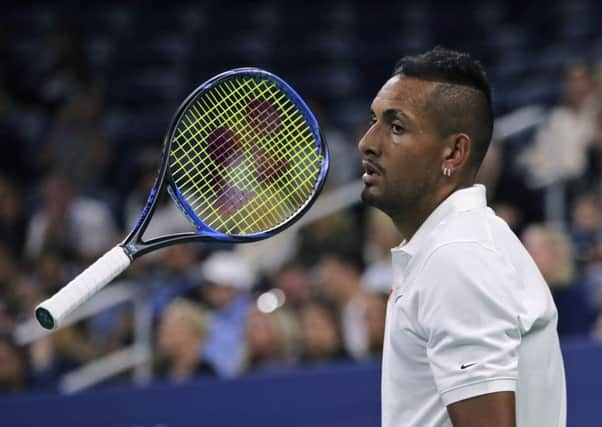Nick Kyrgios faces ban and fine after ‘corrupt’ jibe at ATP


The Australian world No 30 lashed out at the ATP following his US Open first-round win over Steve Johnson in the early hours of Wednesday morning. During the match he had been reasonably well behaved and had played some blistering tennis, but it was afterwards, in his press conference, that he jumped head first into hot water.
Asked about his most recent fine – a $113,000 penalty picked up at the Cincinnati tournament two weeks ago – he pulled no punches. “The ATP is pretty corrupt anyway. I’m not fussed about it at all,” he said to reporters.
Advertisement
Hide AdAdvertisement
Hide AdComing on the back of his behaviour in Cincinnati, where he was sanctioned for verbal abuse of an official, ball abuse, leaving the court without permission, audible obscenity and four counts of unsportsmanlike behaviour, it was obvious that the authorities would throw the book at him this time. The ATP have launched an investigation and are reviewing the case under the “major offence” rule – hence the severity of the possible sanction.
In a statement, the ATP said: “The comments made by Kyrgios after his first-round match in New York will be assessed under Player Major Offence provision under ATP Rules. A determination will be made by Gayle David Bradshaw, Executive Vice President, Rules & Competition, following an investigation as required by ATP rules”
By lunchtime yesterday, Kyrgios had had time to think again and took to Twitter to offer his side of the story. It was hardly an apology but it did give some background to his comments.
“I would like to go on record to clarify my comment around the ATP being corrupt,” he wrote. “It was not the correct choice of words and my point and intention was to address what I see as double standards rather than corruption.
“I know my behaviour at times has been controversial and that has landed me in trouble, which at times is granted and valid but my issue is around others whether gaining the same, less or more media attention doing the same or similar behaviour and not being sanctioned. That’s my issue and it continues to be. To be clear, I know I’m not perfect and do not pretend to be and I acknowledge I’ve deserved fines and sanctioning at times but I expect consistency and fairness with this across the board, to date that’s not happened.
“I’ve had huge support from Chris Kermode [the outgoing executive chairman and president of the ATP] and have given it in return, so I want to clarify my comments but stand by my beliefs and sentiment around double standards.”
Kyrgios has a point, of sorts. In the same section of the code of conduct that covers the “major offence” rule, the one that could throw the Australian out of the game for three years, there is a section that covers “the integrity of the game”.
It reads: “A player, or related person, charged with a violation of a criminal or civil law of any jurisdiction may be deemed by virtue of such charge to have engaged in conduct contrary to the integrity of the Game of Tennis.”
Advertisement
Hide AdAdvertisement
Hide AdIt goes on to say that the ATP “may provisionally suspend such player, or related person, from further participation in ATP tournaments pending a final determination of the criminal or civil proceeding.”
And yet when Justin Gimelstob, then a member of the ATP board, was charged with felony battery, he was allowed to remain in his post. Even when he was found guilty (by dint of pleading “no contest”) and sentenced to three years’ probation, 60 days of community service and a year of anger-management classes, he was still allowed to keep his job with the ATP.
It was only when the weight of public opinion became too great that Gimelstob resigned from both the ATP and from his position as a commentator at the Tennis Channel.
In contrast, Kyrgios picks a verbal fight with an umpire in Cincinnati and picks up a six-figure fine and then makes an ill-judged remark at 1.45am after a match and finds himself facing a career-ending suspension. It does not excuse Kyrgios’s actions but it does shed a little light on his feelings of injustice.